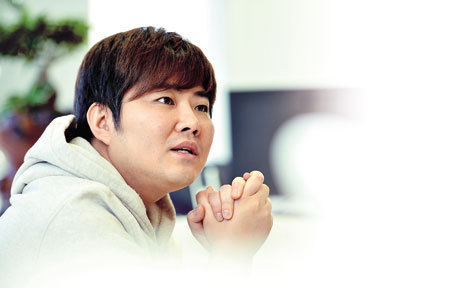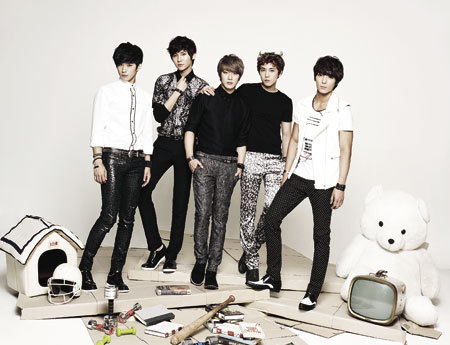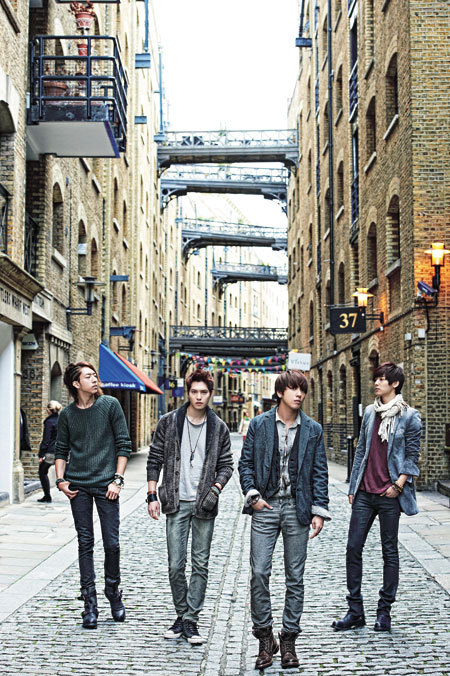FNC Entertainment: Carving Out Niche with PopRock Bands (FT Island, CNBLUE, JUNIEL)

Han Seong-ho, CEO of FNC Entertainment, talks about his vision for new types of music and entertainment in his new office in Cheongdam-dong, southern Seoul.
The four lanky, good-looking guys of the rock band CNBLUE are everywhere these days, on music charts, shows and in TV dramas. Their most recent single “I’m Sorry” topped the charts after its release Jan. 14.
In addition, bassist Lee Jung-shin, 21, is starring in a popular network drama; while guitarist Lee Jong-hyun, 22, and drummer Kang Min-hyuk, 21, have recently wrapped up popular television dramas of their own. Front man Jung Yong-hwa, 23, in the meantime, wrote much of the music for the group’ s recent album “Re: Blue.”
But it is when they are performing live together that the four assume a new identity. Happier and more confident to do their own stuff four years after their debut, the members exude a raw edge and iness. It is a quality that carves out a niche for them in the K-pop landscape dominated by cute y girl groups and androgynous boy-groups featuring danceable electro pop music.

Members of FT Island pose in this photo released by FNC Entertainment. FT Island was the first successful pop rock group band produced by Han Seong-ho, CEO of FNC Entertainment.
The ability to jump to a new dimension when performing, and to write their own music as well as their clean, good looks has them in a strong position in the K-pop scene. They are the second fruit to bloom under the creative direction of Han Seong-ho, 39, the CEO of FNC Entertainment.
“I think there is a bias when a group is born pre-planned, and its members are good-looking that somehow the music would lag. But CNBLUE is showing that when you’ve got talent and work hard, there will come a time to break through the bias,” said Han in a recent interview with The Korea Times at his office in Cheongdam-dong, southern Seoul. “They have worked hard all these years, performing on the streets, in Japan and other venues.”
Han may well know what he’s talking about. Going against the industry, he produced his first successful pop rock band FT Island in 2007 and they immediately topped the charts. His company itself is an attempt to shatter preconceived notions about the Korean pop industry.

Solo singer Juniel is also with FNC Entertainment
Career-wise, Han follows his predecessors in the entertainment industry in that he himself was a singer before he turned to producing. Lee Soo-man, founder of SM Entertainment and Park Jin-young of JYP Entertainment were singers and Yang Hyun-suk of YG Entertainment was a rapper/dancer with Seo Taiji and Boys before they turned to producing.
But rock was Han’s first love. He was a member of a college rock band “White Horse,” when he was a student of Chinese language at Myongji University.
“Rock music … it varies by the day, depending on the condition of the performers, the response from the audience … While the song is the same, the performance becomes different each time,” Han said. “That’s its beauty.”
So he decided to go with his first love when founding FNC Music — the predecessor to FNC Entertainment — in July 2006. But he was also a relative latecomer to the K-pop industry.

CNBLUE remains strong in music charts with their fourth mini-album “Re:Blue,” on which hit single “I’m Sorry” appears.
“I knew I had to be different to be successful, and I knew there was room in the Korean pop market for rock,” Han said.
Speaking in a swanky new office furnished with a plush-looking white leather sofa, the hoodie-and jean-wearing Han was earnest and bursting with enthusiastic energy. Listening to him talk, his passion and conviction are conveyed with a religious fervor. The name of the company, FNC stands for “fish and cake.” If that fervor was a mask of desperateness that spurred him on in the initial difficult years, it is now the other face for a new type of music and entertainment he wants to pursue.
At a time when businesses are moving with prudence, he is expanding. After changing the company name to FNC Entertainment in 2012, he moved to a new company building in January that is four stories high with three underground floors in the posh Cheongdam-dong area. Nearby are the buildings of SM Entertainment, JYP Entertainment and Cube Entertainment, drawing foreign tourists to flock to the neighborhood on a “hallyu (Korean wave) tour.” The sheer size and location of the edifice invariably prompted this reporter to ask if he took out a loan, to which he readily but sheepishly said he did.
His company accounts for the third largest market presence in terms of music sales, only behind SM Entertainment and YG Entertainment. With CNBLUE, FT Island, singer Juniel and girl group AOA currently active, he is planning a new boy rock band to debut this year. Han has also recruited actors to represent including Lee Dong-gun and Yoon Jin-seo.
More significantly, CNBLUE and FT Island will embark on a world tour in April, the first for rock bands from Korea. The schedule for CNBLUE’s concerts in Taiwan, Singapore, Thailand, Beijing and Shanghai are confirmed; the dates in other countries in Europe, the Americas and Australia are still under discussion.
He and his crew are tapping into these markets in what may well be a critical juncture in K-pop and the Korean wave. Since the Korean wave has ebbed and flowed from the early 2000s with dramas and then peaking with K-pop, there has been a quest within the industry to see if other types of Korean music content can also reach other markets — all the more because of the unprecedented success of Psy’s “Gangnam Style.” Han wants to take on this new challenge with his brand of pop-rock music that is comfortable to listen to.
“I want to make good music. To me, good music is one that I am comfortable listening to. I have a seven-year-old son. I can see how he immediately picks up the words that I write as lyrics, and I think about how songs I listened to in my formative years affected me. Music doesn’t have to be provocative or licentious to be powerful,” Han said. “The songs of CNBLUE are strong yet their lyrics are not provocative … Rock music really varies. It can be soft, acoustic, hard…”
However, he is willing to bring adaptation and variation to his groups, because at this point in the Korean wave, he sees a need for balance.
“I want to liken it to food. When foreign foods make an entry to Korea, they are invariably a little Koreanized, which is adopting not compromising. We need to adapt as we take hallyu or things Korean abroad. Adaptation based on conviction is not compromise,” he said.
He has his work cut out for the next decade or two for he has his sights set on carving out a new type of entertainment industry in Korea.
“Entertainment, to me, it means making people laugh, making them cry, i.e. essentially helping people refine their emotions and feelings.”
Source: The KoreaTimes
cr: @cnbjonghyun
Comments